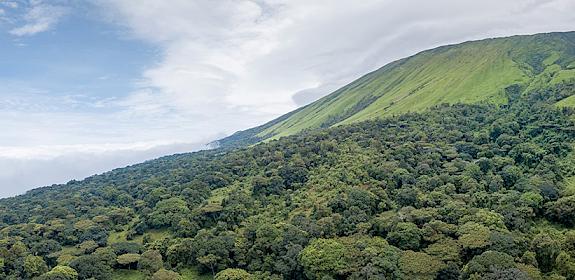World Wildlife Day 2023: partnering to support CITES for almost 50 years
This World Wildlife Day 2023, TRAFFIC joins the celebrations of 50 years of CITES and the crucial role of ‘Partnerships for Wildlife Conservation’ in Washington D.C. On this occasion, TRAFFIC looks forward to contributing to the celebrations by showcasing a partnership story from the Himalayan mountains, ultimately addressing also wild-harvesting of CITES-listed Appendix II plant species, Jatamansi Nardostachys jatamansi and the impact this has had on local communities.
TRAFFIC was established in 1976 as a collaborative partnership by IUCN and WWF in response to the signing of the CITES treaty 50 years ago.
“Partnerships for Conservation are vital, as no organisation, and that includes the UN, can tackle the biodiversity crisis on their own. We have a million species that are threatened with extinction, and it will need all our combined efforts to reverse this. Partnerships bring together people or groups with different levels of experience and expertise, to come up with new ideas and the goal of having impact,” says Ivonne Higuero, Secretary-General of CITES, in her address for the CITES World Wildlife Day video.
Over the last 50 years, wildlife trade issues have become more complex and wide-ranging. Global efforts to address wildlife trade must consider not only conservation impacts but also the socio-economic impacts on the communities and countries concerned, as well as the role these efforts must play in addressing global challenges such as climate change and health.
The triple threats of biodiversity loss, ecosystem degradation, and climate change require urgent global action. No one organisation has the necessary resources and solutions – we must work together and build strong coalitions to drive change.”
Richard Scobey, TRAFFIC Executive DirectorScobey continues, "TRAFFIC takes deliberate action to work in partnership to maximise our conservation impact and influence key target audiences to ensure that trade in wild species is legal and sustainable, for the benefit of the planet and people."
Successful partnerships for conservation must find ways of connecting global frameworks, business supply chains and sustainable local community harvest, use and trade initiatives if the world is to reverse the loss of biodiversity.
Watch the CITES event live stream
A Partnership Story from the Himalayan Mountains
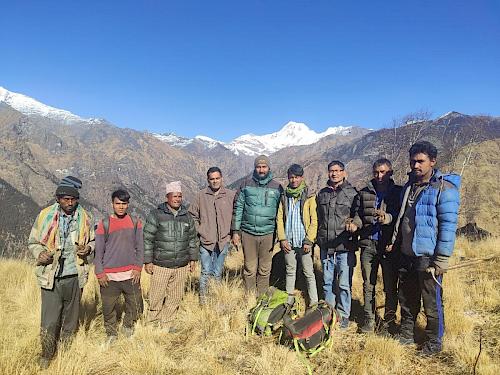
Image courtesy of ANSAB.
At the hybrid event, Richard Scobey will explain how a TRAFFIC project, funded by the UK Government through the Darwin Initiative, worked with partners and the Nepalese government to implement good practices – including through piloting FairWild market-based tool in wild-harvesting of CITES-listed Appendix II plant species, Jatamansi Nardostachys jatamansi and the impact this has had on local communities.
Scobey will explore how this species’ trade in Nepal supports over 15,000 people’s livelihoods with an average of 25% of their annual income, how its ongoing success is critical to maintaining a climate change-sensitive habitat home to the Vulnerable* Snow Leopard, Panthera uncia, and how, now, working with our partners, local Community Forest User Groups sustainably manage the traceable supply as the leading exporting country of Jatamansi.
With TRAFFIC partners, this project has evolved into Himalayan plants for people: sustainable trade for biodiversity and development, further funded by the UK Government through the Darwin Initiative to act as a blueprint for other Non-Timber Forest Products (NTFPs) in the country.
The learnings from the project are already being shared through other projects, such as WildCheck.info, which offers objective insights and advice on sourcing wild ingredients to support business, investment, and policy scoping.
Watch the CITES event live stream
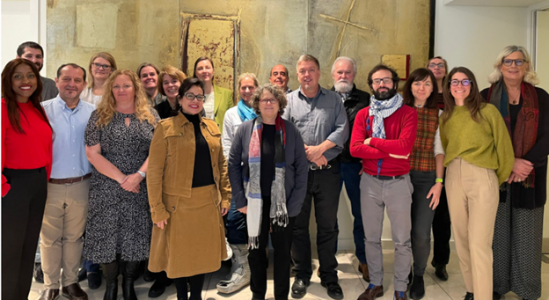
Image courtesy of CPW
Collaborative Partnership on Sustainable Wildlife Management also celebrates its 10th anniversary in March
As a founding partner, TRAFFIC also joins the announcement of a prominent example of a productive partnership, the Collaborative Partnership on Sustainable Wildlife Management (CPW). It is a partnership among 14 international organisations with substantive mandates and programmes to promote the sustainable use and conservation of wildlife resources that the CPW has agreed to work together.
On the occasion of World Wildlife Day, the CPW has announced its plan to work together on the following new priorities:
- To support countries to ensure that the use and trade of wildlife is legal, sustainable and safe;
- To raise awareness of the links between sustainable use of wildlife, food security, livelihoods and well-being, culture and the integrity of landscapes;
- To promote the prevention, management and reduction of human-wildlife conflict and enhance coexistence;
- To embed the sustainable use and management of wildlife in the One Health agenda; and
- To advocate for sustainable and inclusive wildlife economies.
Notes:
*Snow Leopard, Panthera uncia, is listed as Vulnerable on The IUCN Red List of Threatened SpeciesTM
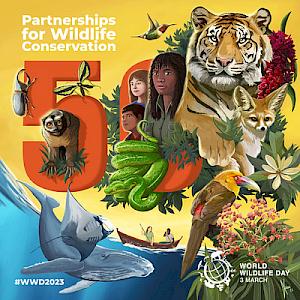 50 years of cites success
50 years of cites success
The original CITES agreement covered only 80 species, but it has since expanded to include more than 37,000 species of animals and, as demonstrated by the Jatamansi project, plants. From the 80 signatories that signed the Convention in 1973, CITES today boasts 184 countries around the globe.
CITES provides its Parties with a rich set of tools to implement the Convention - ranging from monitoring tools such as the CITES Trade Database and the Elephant Trade Information System to non-detriment findings that ensure the harvest is not to the detriment of a species.
The CITES 50-year anniversary and World Wildlife Day event is hosted by the United States Government and the CITES Secretariat, in partnership with UNDP, Jackson Wild, the International Foundation for Animal Welfare and the National Geographic Society. Event Live Stream

The Himalayan plants for people: sustainable trade for biodiversity and development project is generously supported by the United Kingdom's Government Darwin Initiative.
Convention on International Trade in Endangered Species of Wild Fauna and Flora (CITES)

The Convention on International Trade in Endangered Species of Wild Fauna and Flora, is an international agreement between governments that aims to ensure that international trade in specimens of wild animals and plants does not threaten their survival. Find out more here.
About Collaborative Partnership on Sustainable Wildlife Management
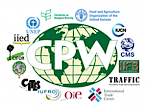
TheCollaborative Partnership on Sustainable Wildlife Management (CPW) is a voluntary partnership of 14 international organizations with substantive mandates and programmes to promote the sustainable use and conservation of wildlife resources. The mission of the CPW is to increase cooperation and coordination on sustainable wildlife management issues among its members, where such adds value, in order to promote the sustainable management of terrestrial vertebrate wildlife in all biomes and geographic areas, contributing to the conservation and sustainable use of biodiversity, and to human food security, livelihoods and well-being.
About Asia Network for Sustainable Agriculture and Bioresources (ANSAB)

Established in 1992, ANSAB has a vision of rural South Asia built on rich biodiversity and prosperous communities. This vision includes rich, healthy and productive ecosystems actively managed and sustainably used by formerly poor local communities. It also features adaptive people and resilient ecosystems able to cope with global climate change. Generate and implement community-based, enterprise-oriented solutions that conserve biodiversity and improve the livelihoods of the poorest of the poor while bolstering national economic development and addressing climate change is the mission of ANSAB.
ANSAB has implemented conservation and development programmes in more than 30 districts of Nepal and provided policy inputs and services to the government and development partners in seven Asian countries. ANSAB has introduced FSC certification in Nepal, supported enterprises in achieving organic and wildlife-friendly certification, supported NTFPs collector groups and producer enterprises for their management practices complying with FairWild standards, and led successful on-the ground implementation of the UKAID funded Darwin Initiative project 25-018. After the successful implementation of the project 25-018, UKAID funded Darwin Initiative program further provided the project 28-026 for the upscaling of the successes.
About the Darwin Initiative

Funded by the UK Government through the Darwin Initiative.
The Darwin Initiative is a UK government programme with a focus on biodiversity projects.


